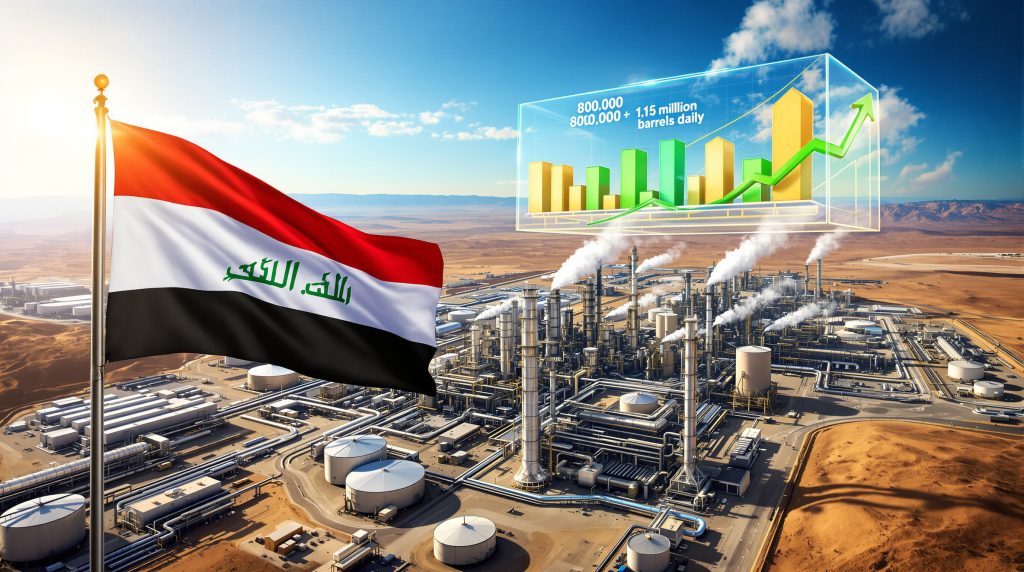Iraq's announcement to cease importing gasoline, diesel, and kerosene represents a dramatic transformation in Middle Eastern energy dynamics. This strategic pivot from dependency to self-reliance follows years of systematic infrastructure reconstruction and capacity expansion after decades of conflict-related disruption. The decision underscores how recent oil price rally 2025 conditions have incentivised domestic production investment.
Prime Minister Mohammed Shia Al Sudani's directive on November 4, 2025, to halt imports of middle distillates marks a significant milestone for the OPEC member nation. The decision reflects Iraq's enhanced domestic production capabilities and modernised refining infrastructure, positioning the country as a potential regional energy exporter rather than consumer. Furthermore, this shift comes amid significant drilling policy shift discussions across major oil-producing regions.
Modernised Refining Infrastructure Drives Independence
Iraq's journey toward fuel independence began with comprehensive refinery modernisation across multiple strategic facilities. The country systematically rebuilt processing capabilities from damaged infrastructure into efficient, modern operations capable of meeting domestic demand specifications.
Current Refining Capacity Metrics:
| Production Category | Previous Level | Current Capacity | Future Target |
|---|---|---|---|
| Daily Refining | 800,000 b/d | 1.3 million b/d | 1.5+ million b/d |
| Capacity Increase | Baseline | 62.5% expansion | 87.5% growth |
| Annual Savings | $0 | $4-5 billion | $10+ billion |
The transformation involved three primary facilities receiving substantial upgrades. According to industry analyst Palash Jain at FGE NexantECA, Iraq's recent refinery improvements at Karbala, Basra, and Kirkuk facilities have substantially enhanced the country's capacity to meet domestic refined product requirements. These modernisation initiatives directly contributed to reducing import needs and creating budget reallocation opportunities.
Critical infrastructure restoration included:
- Karbala Refinery commissioning with enhanced conversion capabilities
- Basra facility upgrades focusing on Euro-specification product quality
- Kirkuk refinery processing efficiency improvements
- $3.75 billion Fluid Catalytic Cracking project completion
The reconstruction efforts addressed significant wartime damage, including the complete destruction of the Shamal refinery by Islamic State forces in 2014. This facility, with 150,000 barrels per day capacity, represented substantial lost processing capability during the conflict period from 2014-2017. Moreover, these developments align with broader industry evolution trends observed across the energy sector.
Production Expansion Through Strategic Field Development
Iraq simultaneously expanded crude oil production to supply both domestic refineries and export markets. The Nasiriyah field exemplifies this dual-track approach, increasing output to 80,000 barrels per day through deployment of nine additional wells during 2025.
September 2025 Export Performance:
- Total oil exports: 3.4-3.45 million barrels per day
- OPEC+ quota compliance maintained
- Second-highest OPEC producer status preserved
- Domestic refining feedstock allocation optimised
This production allocation strategy maximises economic value by capturing refining margins of approximately $15-25 per barrel while maintaining export revenues from crude sales at current pricing levels of $59-65 per barrel. The strategic timing also benefits from reduced global trade impact pressures on energy markets.
Qualifying Iraq's Self-Sufficiency Claims
Despite official declarations of fuel independence, Iraq continues importing specialised petroleum products that domestic refineries cannot yet produce to international specifications. The country still requires high-octane motor gasoline and certain low-sulphur diesel grades meeting Euro-specification quality standards.
Import Reality Check:
- 2024 gasoline imports: 120,000 barrels per day
- H1 2025 gasoline imports: 50,000 barrels per day
- Import reduction: 58% year-over-year decrease
- Continuing requirement: Specialty fuel grades for quality compliance
Customs data from UAE and India for Q2 2025 demonstrate continuing refined fuel exports to Iraq, though at substantially reduced levels. This indicates Iraq has achieved self-sufficiency in standard middle distillates while maintaining selective imports for premium product categories.
What Does True Self-Sufficiency Mean for Iraq?
True self-sufficiency encompasses not only meeting basic fuel demand but also producing all refined product grades required for domestic consumption. Iraq's achievement primarily covers standard distillates whilst premium grades still require imports.
Regional Energy Trade Implications
Iraq's transition from major importer to potential exporter creates significant shifts in regional refined product markets. Traditional suppliers, particularly UAE refiners and Indian exporters previously serving Iraqi demand, must redirect approximately 180,000-200,000 barrels per day to alternative markets.
Market Reallocation Effects:
- Reduced demand pressure on Persian Gulf refineries
- Supply availability increase in regional markets
- Competitive positioning adjustments among Middle Eastern producers
- Logistics and shipping route modifications
The removal of Iraqi demand represents roughly 0.8-1.0% of global refined product trade volumes, creating modest supply-side relief but with asymmetric distribution across product categories. However, low-sulphur diesel markets may experience greater relief given Iraq's historically significant import volumes.
Economic Benefits and Budget Impact
Iraq to end fuel imports delivers substantial fiscal advantages through reduced foreign exchange outflows and budget flexibility enhancement. The estimated annual savings of $4-10 billion removes structural pressure from national reserves while enabling resource reallocation toward development priorities. Additionally, this decision helps mitigate tariffs and inflation pressures affecting global commodity markets.
Fiscal Transformation Metrics:
- Previous annual import expenditure: $5 billion baseline
- Estimated reduction percentage: 75% from peak levels
- Foreign currency preservation: Reduced USD exchange pressure
- Investment capacity enhancement: Multi-billion dollar availability
"The budget relief creates opportunities for infrastructure investment, debt service reduction, social spending increases, or accelerated energy sector development programs supporting broader economic diversification objectives."
Persistent Electricity Generation Challenges
While achieving refined product independence, Iraq faces significant power generation obstacles that highlight energy security complexity. The country's electricity deficit demonstrates that fuel self-sufficiency represents only partial energy independence.
Power Sector Constraints:
- Summer demand: 45,000 MW requirement
- Installed capacity: 27,000 MW available
- Capacity shortfall: 40% deficit during peak periods
- Iranian gas dependency: Critical for electricity generation
Iran's decision to reduce natural gas supplies by half in July 2025 further complicated Iraq's power situation, reducing electricity production by 4,000 MW. Consequently, this dependency contradicts claims of comprehensive energy independence and demonstrates ongoing regional interconnectedness requirements.
Strategic Partnership Development
Iraq has initiated several major energy partnerships addressing both electricity generation and natural gas development challenges. These agreements represent long-term commitments to achieving complete energy independence by 2027.
Major Partnership Initiatives:
GE Vernova and UGT Renewables Agreement:
- Target capacity: 27,000 MW electricity generation
- Investment value: Multi-billion dollar commitment
- Timeline: Implementation through 2026-2027
Gas Growth Integrated Project (GGIP):
- Partners: TotalEnergies, Basrah Oil Company, QatarEnergy
- Scope: Gas recovery, solar power, oil development, water supply
- Ratawi field target: 210,000 barrels per day production
- Gas flaring elimination: Environmental and economic benefits
These partnerships address Iraq's next phase energy priorities, focusing on natural gas self-sufficiency and renewable energy integration while maintaining oil production growth.
How Will These Partnerships Transform Iraq's Energy Landscape?
These strategic alliances will diversify Iraq's energy portfolio beyond crude oil production, incorporating renewable sources and advanced gas processing capabilities. Furthermore, they establish technological transfer frameworks essential for long-term operational sustainability.
Comparative Regional Analysis
Iraq's achievement places it alongside other major oil producers who have successfully developed domestic refining capabilities serving national consumption while creating export opportunities.
Regional Energy Independence Comparison:
| Country | Refining Strategy | Integration Level | Export Capability |
|---|---|---|---|
| Saudi Arabia | Petrochemical focus | Advanced vertical | Global markets |
| UAE | Diversified portfolio | Multi-emirate | Regional hub |
| Kuwait | Capacity expansion | Domestic priority | Regional supply |
| Iraq | Newly self-sufficient | Basic coverage | Potential exporter |
This regional context demonstrates Iraq's progression from energy importer to potential competitor in Middle Eastern refined product markets, intensifying competition among established suppliers.
Investment Opportunities and Industrial Development
Energy self-sufficiency creates foundation conditions for broader industrial expansion, as reliable fuel supply supports manufacturing and processing sectors previously constrained by import dependencies.
Downstream Development Potential:
- Petrochemical industry expansion utilising associated gas
- Nitrogen fertiliser production from natural gas feedstock
- Manufacturing sector growth with stable energy supply
- Storage infrastructure and distribution network enhancement
Iraq's substantial natural gas reserves, much currently flared during oil production, represent significant petrochemical development opportunities. Converting waste gas into value-added products could generate additional export revenues while improving environmental performance.
What Industries Could Benefit Most from Energy Independence?
Manufacturing sectors requiring consistent energy inputs, such as steel production, cement manufacturing, and petrochemical processing, stand to benefit significantly from Iraq's enhanced energy security. In addition, agricultural processing industries could expand operations with reliable fuel supply guarantees.
Timeline for Complete Energy Independence
Iraq targets natural gas self-sufficiency by 2027 through associated gas capture projects and new field developments, which would complete its comprehensive energy transformation journey.
Development Milestones:
- 2025: Refined product export initiation potential
- 2026: Expanded gas processing and renewable capacity
- 2027: Natural gas independence target achievement
- 2030: 40% refined product share of total export revenues
This timeline depends on successful partnership implementation, infrastructure construction completion, and sustained investment in gas capture and processing technologies.
Global Market Dynamics and Competitive Positioning
Iraq's enhanced refining capacity provides greater flexibility in crude oil allocation between domestic processing and export markets, potentially influencing OPEC+ production decisions and global supply balances.
Strategic Market Benefits:
- Value-added product export capability
- Reduced exposure to crude price volatility
- Enhanced economic diversification metrics
- Improved energy security positioning
The development exemplifies growing trends among oil-producing nations toward vertical integration, capturing higher-margin refining and petrochemical activities rather than relying solely on raw material exports.
Challenges and Risk Factors
Several factors could impact Iraq's sustained fuel independence, including operational efficiency maintenance, quality standard achievement, and market demand fluctuations.
Operational Considerations:
- Refinery maintenance and upgrade requirements
- Technical expertise and workforce development needs
- Quality control consistency for international standards
- Infrastructure security and protection measures
Market Risk Factors:
- Global refined product pricing volatility
- Regional competition from established exporters
- Domestic demand growth exceeding capacity expansion
- Technology advancement requirements for specialty products
What Are the Key Risks to Maintaining Self-Sufficiency?
Technical operational risks include equipment failures, maintenance delays, and skilled workforce shortages. Moreover, geopolitical risks such as regional conflicts or trade disruptions could impact sustained production capabilities.
Environmental and Sustainability Implications
Iraq to end fuel imports strategy includes environmental considerations through gas flaring reduction and renewable energy integration components within major partnership agreements.
Sustainability Initiatives:
- Associated gas capture reducing environmental waste
- 1 GW solar power plant development through GGIP
- Water conservation through seawater supply projects
- Reduced transportation emissions from import elimination
These environmental benefits align with global energy transition trends while maintaining economic development priorities for the oil-dependent economy.
Future Market Positioning and Export Potential
As Iraq consolidates refined product self-sufficiency, the country may transition toward regional export markets, creating new competitive dynamics among Middle Eastern suppliers.
Export Development Prospects:
- Surplus refined product capacity utilisation
- Regional market penetration strategies
- Quality enhancement for international competitiveness
- Logistics infrastructure development for export efficiency
The success of this transition depends on maintaining production efficiency, achieving consistent product quality, and developing distribution networks capable of serving external markets. According to Oil Price analysis, Iraq's domestic production has now exceeded local demand, creating export opportunities.
Iraq to end fuel imports represents more than operational achievement; it signals fundamental strategic reorientation toward domestic value creation and regional energy leadership. This transformation demonstrates how systematic infrastructure investment can convert dependency into competitive advantage, establishing precedents for other resource-rich nations pursuing similar energy independence objectives.
The accomplishment also highlights comprehensive planning importance, as Iraq to end fuel imports whilst continuing to address electricity generation challenges. The next development phase will determine whether this momentum translates into complete energy independence and sustainable economic diversification beyond petroleum dependence.
Note: This analysis is based on publicly available information and industry reporting. Energy market conditions, geopolitical factors, and operational variables may influence actual outcomes. Readers should consult current market data and professional analysis for investment or policy decisions.
Want to Capitalise on Energy Market Shifts?
Discovery Alert's proprietary Discovery IQ model instantly identifies significant mineral discoveries on the ASX, including companies positioned to benefit from major energy transitions and commodity supply chain shifts. Begin your 30-day free trial today to gain actionable insights and secure your market-leading advantage in this evolving landscape.




